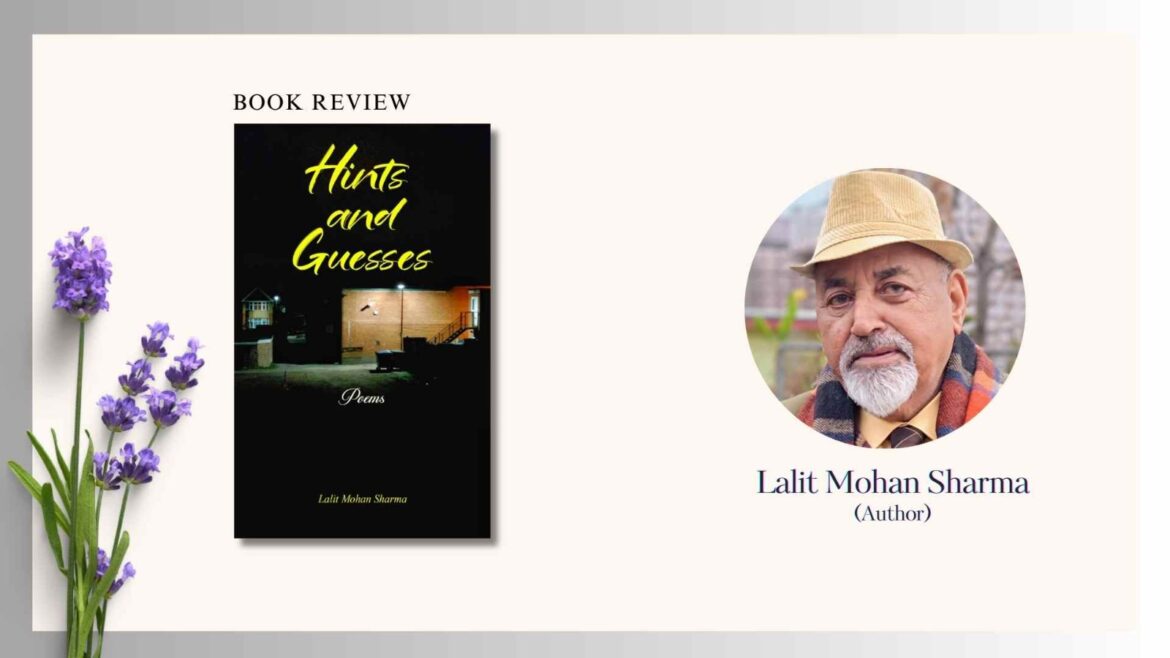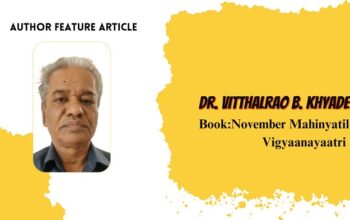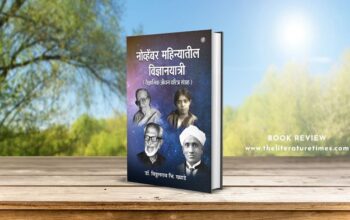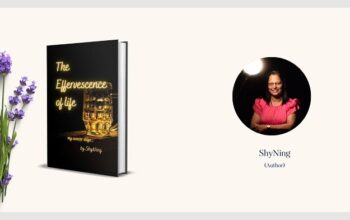Reviewed by: Malini Joshi
Hints and Guesses is an eloquent, meditative collection by Dr Lalit Mohan Sharma, a poet who has long straddled the realms of academia, activism, and personal reflection. In this poetic compendium, Sharma crafts a vivid, introspective tapestry that probes the complex emotional and philosophical terrain of aging, morality, mortality, and memory. With each poem, he invites readers into the crucible of human consciousness—where desire collides with decay, belief meets doubt, and intellect dances with empathy.
The opening poem, “No Qualms,” sets a tone of moral scrutiny. Sharma critiques the misuse of religion, exposing how individuals selfishly deploy God as a shield, a justification, or a witness to their biases. “You pull your God into your embrace… Even to deny others their deserved due” captures this spiritual hypocrisy. The poem underlines the dangerous divorce of ethics from faith in modern society.
In “The Dilemma,” the poet turns inward to reflect on the enigma of desire and self-worth. He candidly reveals the futility of fully understanding another person’s inner world, or even our own, asking, “Do we really know our own clamourings?” This poem is a philosophical journey through the haunting spaces between self-perception, empathy, and emotional projection.
“A Vignette from Venice” offers a moment of stillness and beauty. A woman descends a spiral staircase, carnation in hand, against the backdrop of Venice. It’s cinematic, rich with poised anticipation and quiet elegance. “Eyes as if in wait to see something… Ready to open and utter once the word Beautiful!” evokes the breathless awe of aesthetic encounters.
In stark contrast, “Sudden Death” confronts the inevitability of mortality and the painful disparity between youth and aging. “What’s paradise if it is not beyond man’s patient perseverance?” the poet asks, mourning the ephemerality of vitality and the delusions of permanence in an unpredictable world.
“Controlling the Traffic” celebrates the invisible hands that hold up our nation—workers, farmers, scientists—while calling out media-fuelled success myths. Sharma criticizes how “those who control the traffic in the media enjoy being larger-than-living,” highlighting the stark divide between substance and spectacle.
“Ah, The Virtual” navigates love and longing in the digital age. The poem moves between physical yearning and spiritual detachment, questioning authenticity in a world mediated by screens. “Desire without words, Words without sound” captures the paradoxical emptiness of virtual intimacy, while also honouring its surprising emotional potency.
With “Junoon,” Sharma plunges into surreal, introspective depths. This haunting poem blends dream, memory, and identity, where the poet meets himself as his father. “Motion without a meaning / For my father was leaving” unearths inherited legacies and the psychological inheritance that defines us. The poem blurs generational boundaries and explores empathy as a cerebral, not just emotional, phenomenon.
“Kumbh” is a philosophical inquiry into the nature of divinity. While it uses the backdrop of the Kumbh Mela, it challenges traditional religious experiences. “You relax to call it divine joy / The blessed timeless eternity” is both an embrace and a critique of how humans simplify the complex by calling it sacred. The poem invites readers to question belief and confront illusion.
In “Hints and Guesses,” the title poem of the collection, Sharma addresses mortality and fading masculinity. He writes, “Manhood turns willfully whimsical,” showing the deterioration of instinct and control. As the poet wrestles with existential meaning, he seeks not salvation, but the comfort of mutual compassion and shared purpose.
Perhaps one of the most resonant pieces is “Resurrection,” a poem that explores emotional stagnation and the creative spark that can reignite meaning. “With years arrives not stability / But stagnation,” Sharma writes with raw honesty. Yet the poem uplifts: creativity, particularly writing, becomes the medium of self-reclamation. The nod to artists like Tagore and Monet reinforces the message that it’s never too late to resurrect one’s voice.
Across these poems, Sharma’s style is lucid yet layered, accessible yet profound. His imagery moves fluidly from domestic scenes to cosmic reflections. Themes of aging, disillusionment, resilience, and cultural critique are seamlessly woven into his verse. The tone varies—sometimes mournful, sometimes philosophical, but always grounded in deep observation and emotional intelligence.
Hints and Guesses is not just a collection of poems; it’s a reflective journey through the human condition. It captures the textures of modern life—be it spiritual confusion, digital disconnection, or the quiet rebellions of the aging mind—and offers a poetic mirror to the reader’s own inner life.
Dr Lalit Mohan Sharma’s work stands as a testament to poetry’s enduring power to probe, question, and affirm. This collection deserves to be read slowly, savoured, and returned to—each reading offering new hints, new guesses, and deeper understanding.



